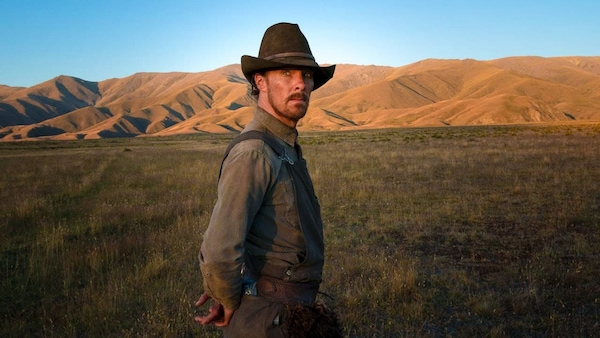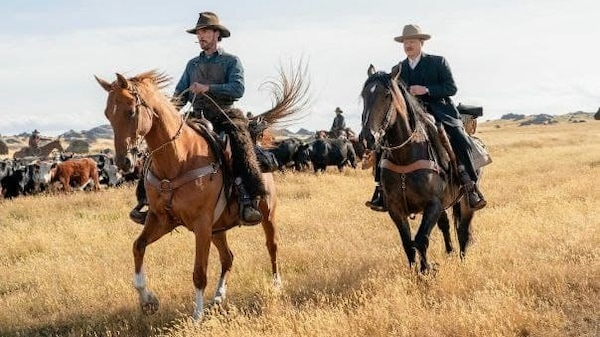The Power of the Dog review: Jane Campion declares resurgence in the Benedict Cumberbatch starrer
Also starring Kirsten Dunst, Jesse Plemons, and Kodi Smit-McPhee, the movie has its Indian premiere at IFFI 52

Last Updated: 01.27 PM, Nov 25, 2021
Story:
Two wealthy ranch owner brothers Phil and George spend time at an inn where they meet inn keep Rosie and her son. All of their lives soon come together, where they are on a path of different emotions.
Review:
An exceptional, nurtured and layed screenplay, captured with top quality capped off by stunning performances. This would be the shortest and most accurate review for Jane Campion’s The Power of the Dog. Starring Benedict Cumberbatch, Kirsten Dunst and Jesse Plemons, the movie is the filmmaker's declaration of resurgence. The rest of the review contains spoilers.
The movie follows the life of two wealthy ranch owner brothers Phil (Cumberbatch) and George Burbank (Jesse Plemons). Set in 1925 Montanna, the filmmaker has delivered big in ensuring the authenticity of what is placed in front of the audience. The movie quickly introduces Phil, who is a bully, shortfuse, macho man who commands attention. With the antics he pulls off, Cumberbatch’s acting delivers the perfect image of Phil. His brother on the other hand, is a soft spoken, nice guy, who gets bullied and bashed by his brother.

As the movie flows forward at a chosen pace, George gets married to inn keep Rose (Dunst), which is not to the liking of Phil. The macho man had earlier left Rose in tears after an episode at the inn. Cumberbatch scores yet again with nuanced acting which portrays a range of emotions including anger and frustration. Rose’s son Peter, who was a victim of Phil's bullying, is a boy who is well mannered and self-styled. The living relationship was bound to get tricky.
As years pass, Rose ends up being an alcoholic, out of pure fear of Phil and what he is capable of. Peter wants to be a doctor, and the brothers live their usual life and Phil is boiling up within his mind, turning himself into a ticking time bomb. The first hints at a domestic show off was seen at the scene where Rose is practicing on the piano while Phil does his own little trick, in a scene which has the fire of a music battle.
At this point in the movie, it is revealed that Phil is secretly gay. The reveal in itself is sensual and mind blowing at the same time and the actor plays the moment to perfection. Once this twist is registered, the viewer could go back through the movie to understand, unravel and marvel at Jane Campion's master screenplay. From the lines where he tells his riding mates about how you can’t see if you can’t see the right things pointing to a mountain to a fairly graphic scene where Phil castrates the cattle, without the least reactions , the movie offers a number of nuanced moments that could be identified on a rewatch.
Another well executed character from the movie is Peter. Who ends up as a good boy who is happy with himself turning into the man he once hated. As he is undergoing the transition from a boy dreaming to be a surgeon to everything that Phil was, the audience is ready to accept this reality. But at the same time, when the menaichal Phil turns into a man who is once again struck by love, desire, lust and care, after the passing of his best friend Branco Henry, a man with whom Phil had to share body heat to survive on a trek.
As soon as both these character arcs take place, the movie slowly unravels into dark moments that were carried out by well placed red herrings. By the end, in a sequence composed like a melody, the movie reveals, also leaving doubt, about how Henry, a well mannered boy, has managed to kill a man as subtle and foolproof.. This marks off the movie's exceptional power to play with the audience's mind, also bending the character's arc at will and precision.

As the movie is about to end, Henry, now with a smirk that is as subtly menaical as Phil’s was, reads out a passage from the Holy Bible that reads “Deliver my soul from the sword, by daling, from the power of the dog”. As it slowly melts in your head what this would mean if a darling mother had said this to her son, the movie comes to an end.
The Power of the Dog is technically wonderful, and Ari Wegner’s cinematography provides some stunning visuals of the landscape to close ups that are filled with meaning, from twirling on a flower to a touch on the arm. The music from Jonny Greenwood is an exercise in perfection, with music that lends drama, suspense, sensual and engaging music, all coupled to the western genre.
Verdict:
The Power of the Dog is a movie backed with an exceptional screenplay, which is expertly captured and also has great performances. The western drama calls for repeated watchings to capture details that would have been missed at the initial watch. Jane Campion adds another great movie to her filmography.
Subscribe to our newsletter for top content, delivered fast.

